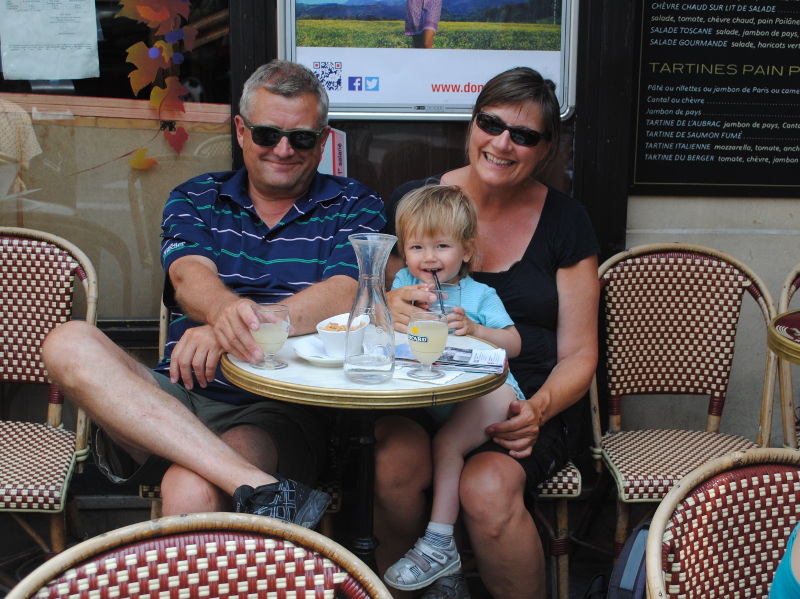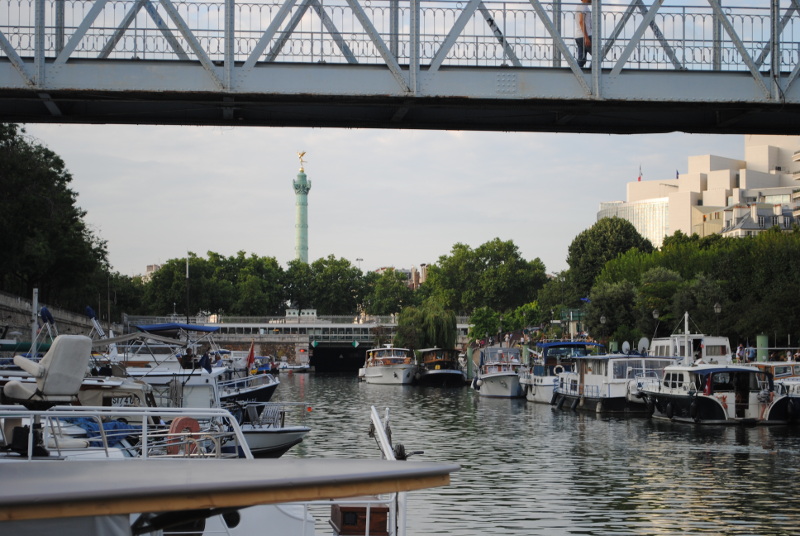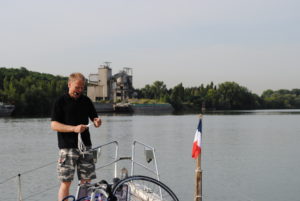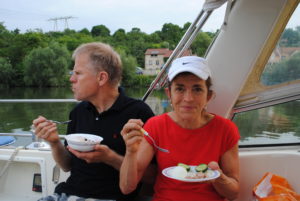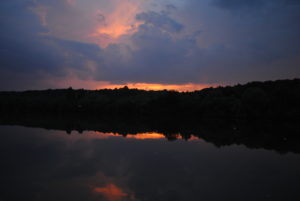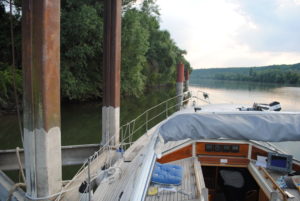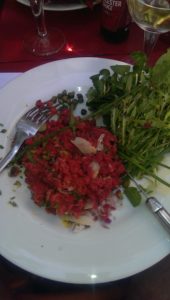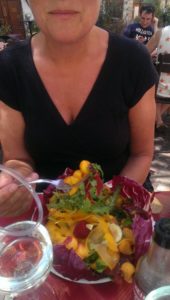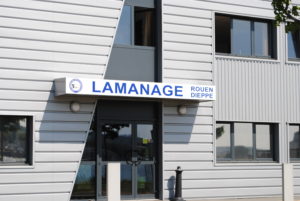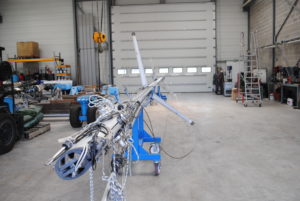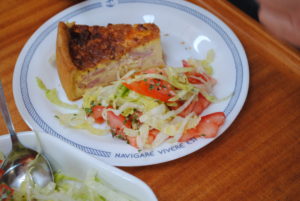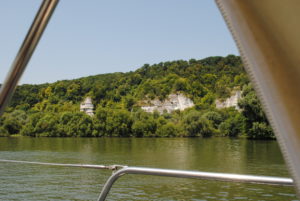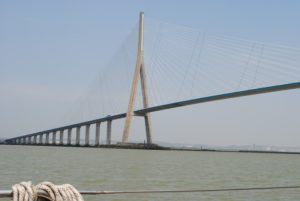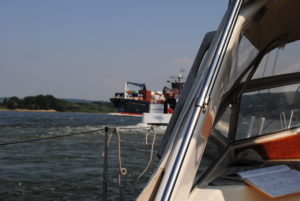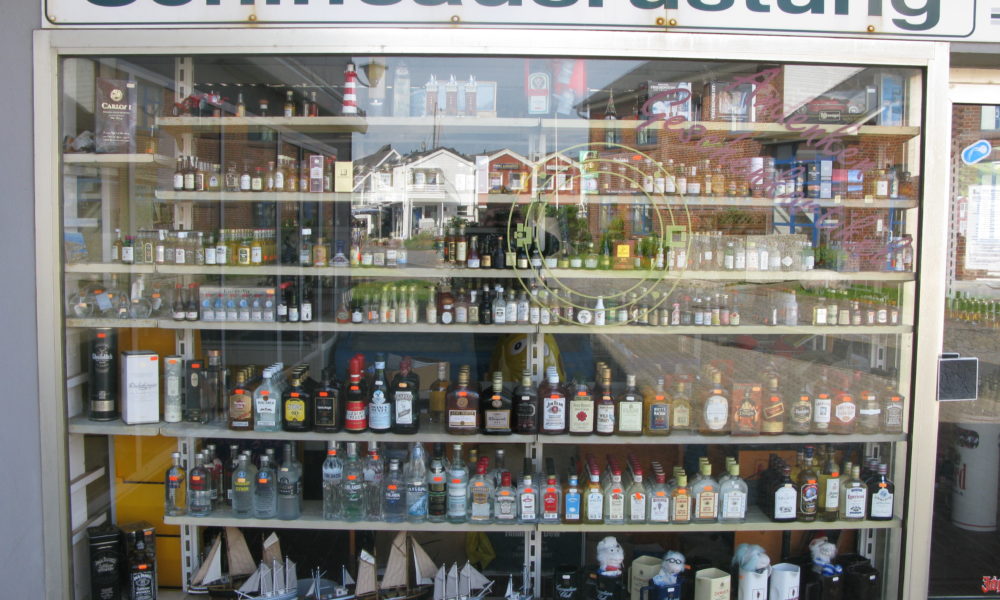
Status: Year two of Ronjas circumnavigation – 2013 – was a fine vintage.
48° 54′ 33.66” N 2° 11′ 30.9984” E
July 29. – 2013
We secure and clean Ronja and pack the car. Three hours later, we are in the heart of the Burgundy district, in the city of Beaune. A new kind of holiday begins. We rented two rooms at an IBIS hotel at almost six hundred crowns per room per night. And one additional room in the Alsatian town of Eguisheim for the nights of Wednesday and Thursday.
In Burgundy, we are together with Vivi and Peter, whom we know through Hanne and Jorgen. We visit wineries, participate in tastings, buying Burgundy wines, celebrating Hannes’s birthday and follow the habbit of the last several days to only seek out restaurants, that are mentioned in the Michelin Guide for France either as Bib gourmands or as having one or two forks. It pays off almost every time. Cheap but very good three-course menus. Typically, at a price between 30 and 37 euros for three courses. We live as earls and barons.
French food gets vindicated during this trip. After the downturn in the so-called modern French cuisine in the 1970s when French food was synonymous with super-small portions, a thin, raw carrot on a plate with a small piece of meat, we actually thought that French cuisine had died. But it most certainly lives, is doing well and is a pleasure not only for the French, who have never recognised that good food can be made elsewhere than just in France.
The good life we continue later in a cute little town of Eguisheim, where the wine is merely replaced with Alsatian wines.
Thursday evening just before nine we are at home in Odense with six boxes of wine and a lot of experiences. Emilie and Molly waiting with food for the weary travellers.
It has been a very varied holiday. Sailing at sea for many days. Waterway navigation for many days. City breaks in Rotterdam and Paris. Epicures in Burgundy and Alsace. The best weather in mans memory. Sunshine almost every day. Family-companionship being with Lasse, Tianling and Nellie and Jørgen and Hanne.
Year two of Ronjas circumnavigation of the globe – 2013 – was a fine vintage.
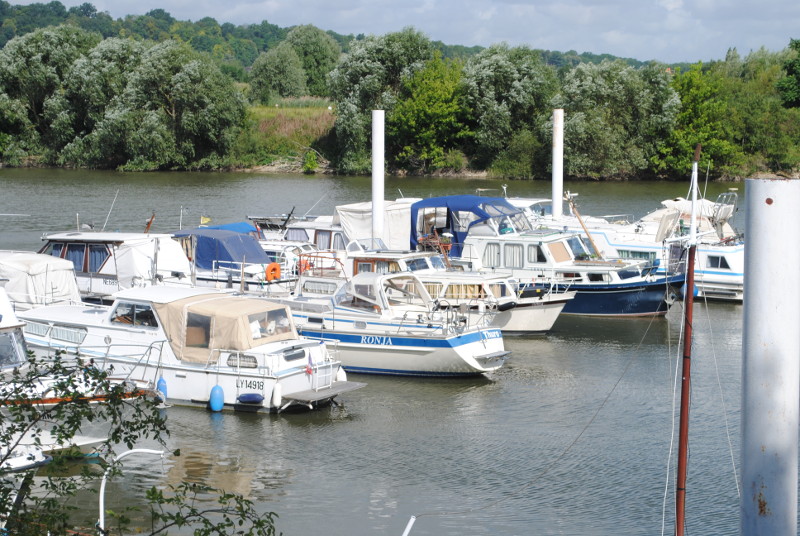
Here Ronja will stay over the winter 2013 to 2014
48° 51′ 3.9636” N 2° 22′ 4.6992” E
July 28. – 2013
In the late afternoon we call at Port St-Louis after a beautiful sailing through Paris and the northern suburbs.

Hanne and Per agree on a contract with the port captain. One years lease of berth in the harbour, supervised boat and help to winterize Ronja – a total of 1,890 Euros or 14,000 Danish kroner. This may sound expensive, but it’s still cheaper than having the boat lie on Thurø in Denmark.
The agreement is, that Per will write in English to the port captain’s son explaining what we want to have done about the boat when winter approaches – oil change, oil filter change, frost protection of water pipes, check the hot water heater and possibly charge the batteries.
The port captain is something of a pocket philosophical chatterbox, we get to hear about his Italian childhood and the difference between nordic values and southern European values. People in the north have lived hard lives. They have no time to talk. They get right to the point, says the harbour master. People in the South are more into each other, and establish a relationship before they reach the matter itself. He is obviously disappointed, that we do not want to talk about the advantages and disadvantages of different forms of contract length, while Per just makes it clear that he only wants a contract of one year.
Port St-Louis is a somewhat worn port, the boats in the harbour are also worn, and the toilet facilities are not something to write about.
We are located in an industrial area, with large ghetto settlements populated by immigrants. Poissy is the hometown of the Peugeot factories. Yet we believe that Ronja has found a good winter home. Kirsten is charming the port’s self-appointed lawman – the other port residents call him Rambo, his real name i Hans – who lives all year in his boat just two berths from ours. We give him the remaining stock of beer and soft drinks from the refrigerator and keep our fingers crossed, that he too will keep a close eye on Ronja.
Log-book: Sailed distance: 81 km or 40 miles. Time: departs at 9:30 am. Paying in Arsenal harbour. At five o’clock, we are – again – at Port St-Louis. Crew: George, Hanne, Kirsten and Per. Weather: Still growing hot. The cockpit tent is up most of the trip in order to provide a little shade.
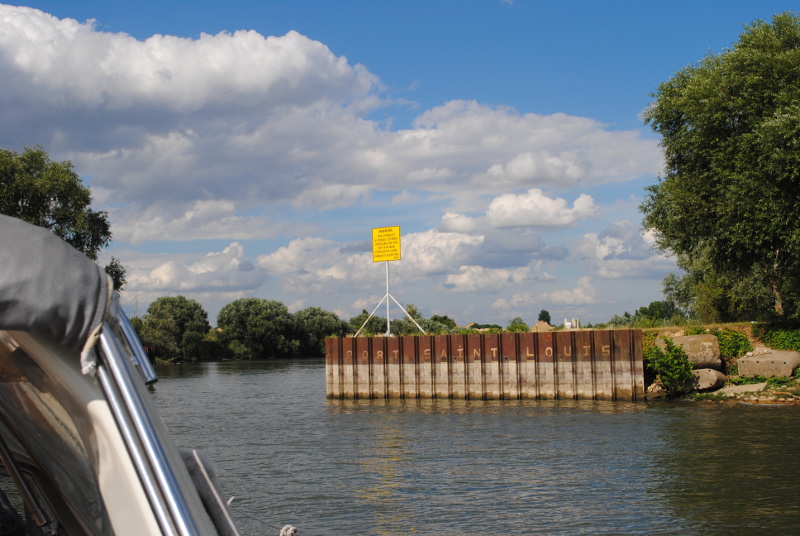
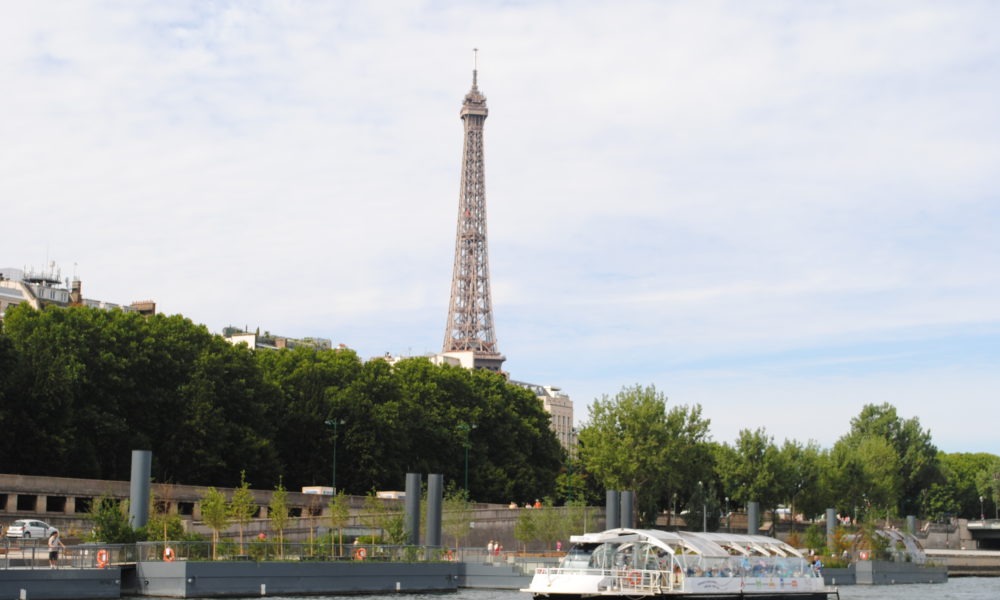
The entrance by sea to Paris is really impressive
48° 50′ 43.1556” N 2° 21′ 55.71” E
July 23. – 2013
It is clearly easier to sail, with more people. With Jørgen and Hanne aboard we go through the locks more easily and we are able to take turns at the helm and chart. And so it’s a huge advantage having a real French language-expert, Hanne, aboard. Shortly after the start of the day, she has reserved a berth in the port of Arsenal and booked a table for 17.30 at one of Michelin’s “bubble-restaurants” – Bib Gourmands – in 11 Arondissement. (The name was by the way Auberge Pyrénées Cévennes, and it had excellent service, mixed food on the menu from Spain and France. Even Nellie was very well behaved, as she was focused on food. Six adults and a baby eat and drink lavishly for 277.50 Euro).
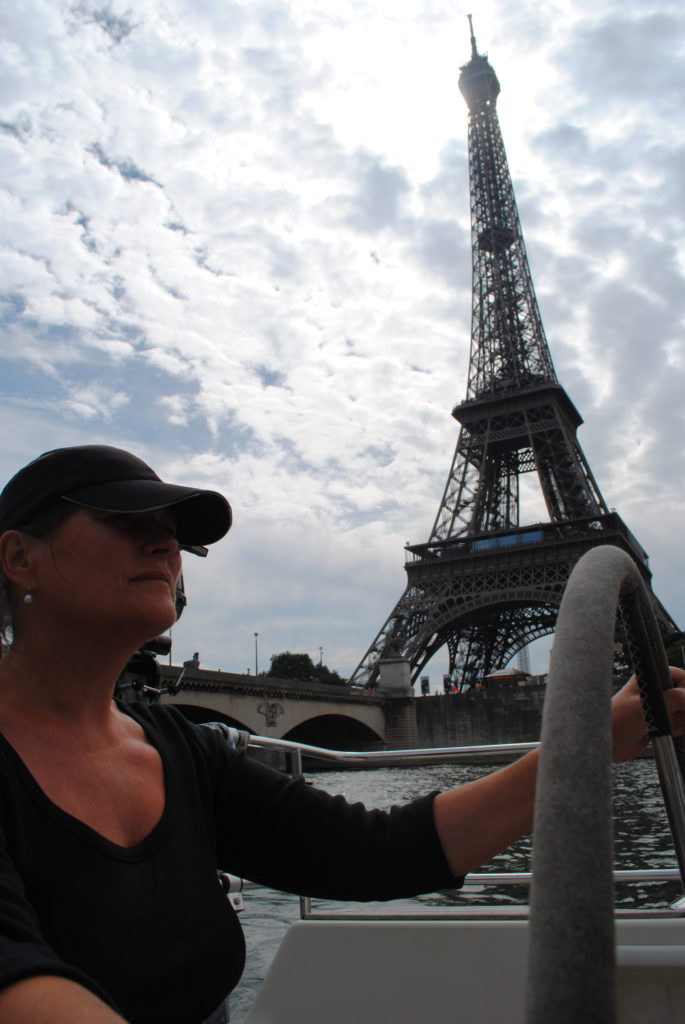
The entrance to Paris is really impressive. We pass it all. Eiffel Tower, the Musee D’Orsay, Notre Dame. We see the poor living in cardboard boxes or tents under bridges. We see tourists by the thousands travel on the Seine on pre-packaged harbour cruises. Inside the Arsenal harbour Nellie, Lasse and Tianling wait. Greatest day of this years journey.
Log-book: Sailed distance: 81 km or 40 miles. Time: depart at 7:30, attuned to today’s first lock. At five o’clock we dock at the Port de Plaisance Arsenal in the middle of Paris. Crew: George, Hanne, Kirsten and Per. Weather: Hot, hot, hot. We put the cockpit tent up in order to block the sun. Shortly before the entrance to Paris’ centre, we get drizzle.
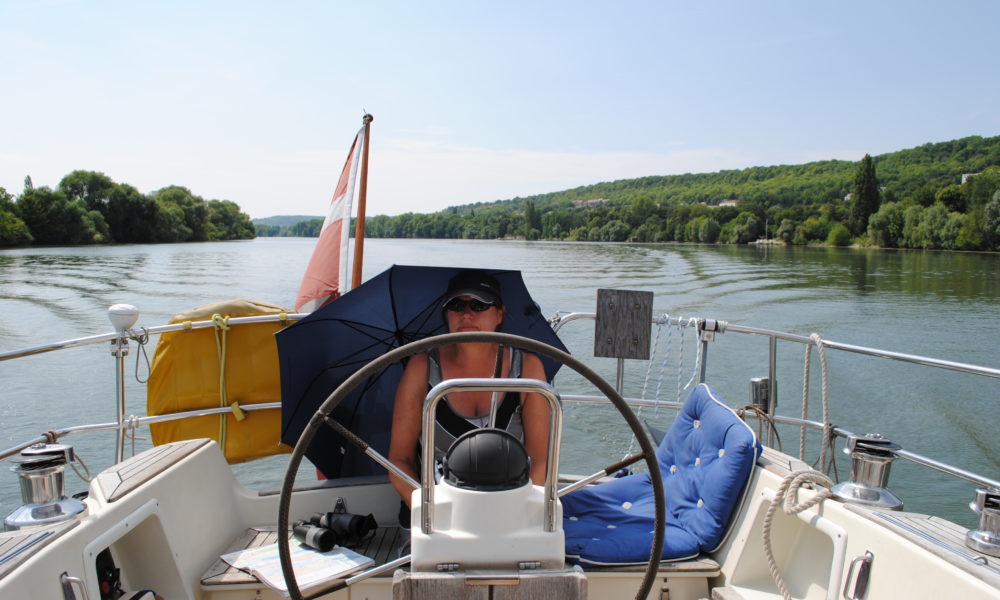
Strange that the French do not use their own rivers
49° 9′ 52.6824” N 1° 23′ 18.7512” E
July 21. – 2013
It will be another hot day, where we take turns having the rudder-manager position. There is plenty to look at over the landscape which alternates between rough rocks and woods, small villages that still turn their back to the river or major industrial areas.
Even after we have left the tidal part of the river Seine, it is still only used to a limited extent for leisure purposes. We meet a few fishermen here, a couple of water scooters and on rare occasions a water skier. During the entire trip between Rouen and Paris, we wind up having only met two sailboats like our own. A Swede and then the French in Rouen. Not even motorboats, which are otherwise suitable for river navigation, we encounter many of.
We are in telephone contact partly with Lasse, Tianling and Nellie, as we have an agreement to meet in Paris on Tuesday afternoon, and partly Jørgen and Hanne, who have announced that they are going to come down to us in the car, and that if they are running non-stop, they can be with us by nine o’clock this evening.
We enter the Port St-Louis. It is barely deep enough for us and we find a berth with both water and electricity. It is a dilapidated port but the first “real” port, we have encountered since Rouen. We buy large quantities at a supermarket in a big immigrant neighbourhood two kilometres from the port. When we want to return to the boat we ask the supermarket, if they can call a taxi. They will not. It’s not their job. Also this part of the service industry have not been trained in helpfulness to strangers.
By nine o’clock Hanne and Jørgen arrive with two bicycles and 20 plastic bags with luggage. Just the essentials. They will stay in the aft cabin. We eat and put a sign in their car, that it will stay in the parking lot for 8-10 days by appointment with the harbour master.
Log-book: Sailed distance: 87 kilometres, covering 43 nautical miles. Time: We leave at 7.30 times to make today’s first lock, Notre-Dame de la Garenne. At 17 we dock at the port of Port St. Louis in the town of Carrieres-sous Poissy. Weather: The same weather continues.
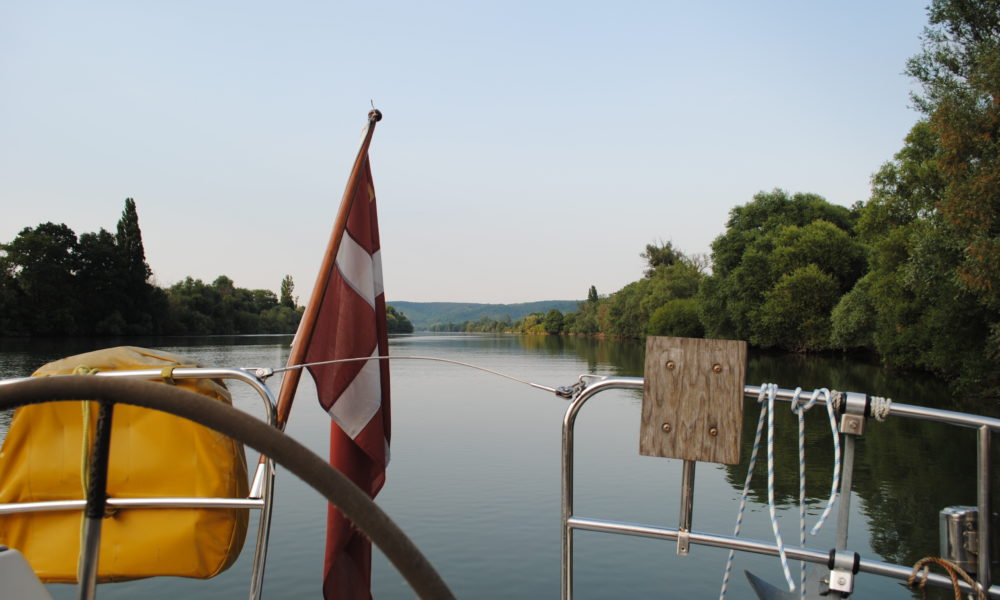
“Get away! Not even I am allowed to moore there!«
49° 26′ 35.6352” N 1° 5′ 59.8956” E
July 21. – 2013
We say goodbye to Monsieur Eric. We say goodbye to the French couple, who are staying in Rouen for another three days while they get their mast put on again, and we seek our one hundred percent French-speaking friend at Lamanage, because we are in search of two pieces of fender boards. At first he is unable to understand one bit. He believes we are in search of a kind of trestle where we can chock Ronjas boom up. Only slowly he understands the fumbling nature of our handling of the French language. “Oh, You want another board,” he says, pointing at the board, we have already stolen at his harbour area.
He takes us in search of a stack of wood and pallets. We find some old, great boards and point where we would like to have holes in the board, which is hard to explain, when you do not remember the French word for hole. Finally we succed. Per offers him 10 Euro as thanks for his help. But he refuses. And we thank him the more verbally with our still somewhat rusty French.
We sail for almost eight hours on an increasingly abandoned Seine. Beautiful. Desolate and largely without moorings. The rule in France is that yachts may not sail later than half an hour before sunset. So we must seize the opportunities that arise.
In the town of Les Andelys we hope to have some luck. They have no ports. But we bet on a particular jetty for river cruising ships. There are no cruise ships at the moment. So we think it will work? It does not. A French person from a riverboat nearby stands up and shouts. “Get away! Not even I am allowed to moore there!« We understand only a little of his tirade and an attempt to get him to indicate where else we can moor, gives no result.
We drift further up the Seine River looking for an anchorage for the night.
Damn Frenchmen. They are apparently still dismissive toward strangers. We have read that French people working in the hospitality industry are sent on courses to learn something new: Being friendly and service-minded towards strangers. Surveys have been shown, that foreigners generally perceive French as arrogant and condescending. And that image the French government wants to do something about. But our aggressive and vociferous friend in Les Andelys probably does not work in the hospitality industry.
Some kilometres further up the river we find a bulwark intended for barges ten times as long as ourselves. We make Ronja firm to the bullwark, and again we find that we’ve got a great place with sunset, birdsong and peace for another wonderful evening meal.
The river map says that there are another 168 kilometres to Paris.
Log-book: Sailed distance: 33 miles. Time: We leave at 12 o’clock after having stowed the sails and bicycles and garden bunkered diesel, which in these parts is in entirety Gasole. Weather: Magnificently hot. Hot in the morning and up to 34 degrees at seven o’clock in the evening. Perhaps we should go back home to more humane temperatures?
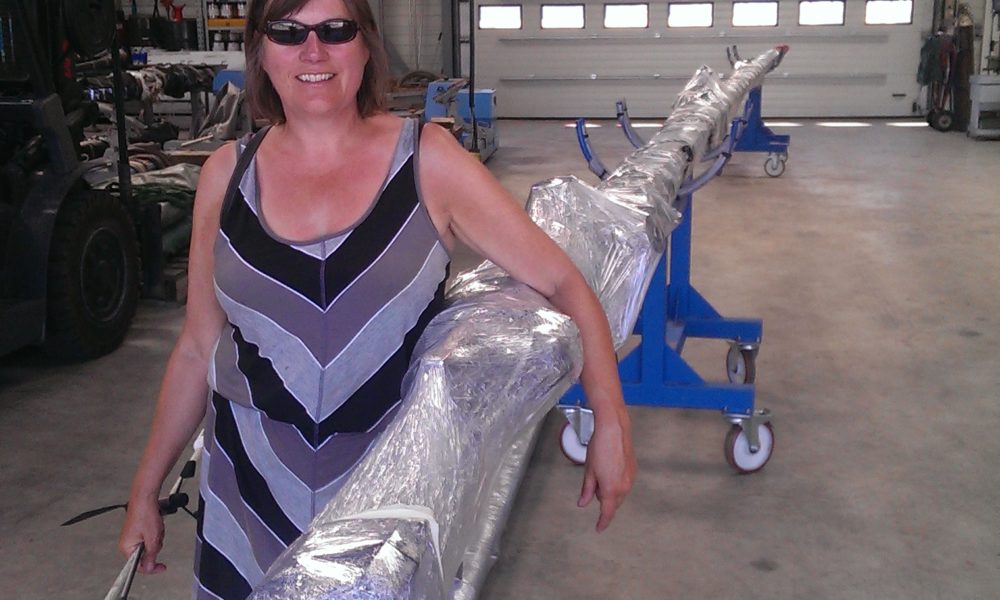
Britons: The french can’t do anything right
49° 26′ 35.6352” N 1° 5′ 59.8956” E
July 20. – 2013
We go to the warehouse at Lamanage. We remove the horns, the defect windpointer, the VHF antenna and the backstay, which is too long to be in the german lorry. We pack the mast in plastic and tape. The same with the boom and kickingstrap. Inside the plastic we place a “sign” with the name “Ronja” and Pers’ contact data.
Here you are. Mast and boom are ready to be transported to the Mediterranean. Per writes in the evening to Wolfgang Graf, that now we are ready with our part of the bargain. The rest is up to him.
Out in the streets again with our electric bikes. It is a great invention. We ride around Rouen for five hours. We see churches and churches and churches. We see old neighbourhoods with original buildings from not just the last century, but previous also. We hurtle away. Uphill. Downhill. Through the pedestrian streets. Electric bikes “rule the world.”
Along the way we find a great lunch restaurant, as French as it can be. Per has a mountain of tartar steak with an egg yolk in the middle and all sorts of condiments to mix with – capers, onions, chives, parsley, tabasco sauce, Worchester sauce. Kirsten gets the best ever salad with cheese and lots of exotic fruits. The absolute best meal we have had in a restaurant during this year’s world tour.
We cycle on. Going into L’Eclerc. A mammoth supermarket as only the French can make them. We buy Quiche Lorraine, ham, cheese and baguette. France, with daytime temperatures of 30 degrees is not great for hot dishes. Rather a small cold thing. Morning, noon and night.
French dislike cyclists. Everything is organised on cardrivers’ premises, and cyclists are fair game. They drive close to us. They cut in front of us. It’s all quite different from our experiences in the Netherlands, where cyclists are abundant and are largely a group of road users who are shown respect.
Back in the marina, it grows hot. We eat and talk a little with our British neighbours in a 39 foot and three story high motorboat. Fred and Margaret. We invite them to a glass of “Chateauneuf du Pape“. “Whauu“, they say. “We are British and normally drink only wine at three euros the bottle.”
They are pleasant to speak with. In fact, they are more normal people than sailors. They had run a construction company, and as the crisis started – they had left it to their son, and having receded, they needed something else to happen. They are like the French in the third boat, eager to pass on their experience of sailing in France. “It’s not about finding a good place to stay on the Seine. It is solely about finding a place,” they say.
There is not much that really works for the French, according to the two Britons. “No, the Dutch have much more control over their things,” they think after having also sailed part of the Netherlands over many years. They live twenty kilometres outside of London, and have their boat lying in Ipswich.
The greatest experience on their actual trip was a visit to Monet’s garden. Visit it. It is fantastic. Otherwise, they are most concerned with their criticism of the French, who can not find out how to do anything right. Later in the evening we move onto their boat and get British coffee – weak “but better than the French, who’s is so strong that the spoon is standing in the coffee” – and cookies. Cosy people. But probably more to gardens than boats.
The British give us their own list of accommodations along the Seine with a lot of handwritten comments on the individual sites.
Today’s harbour master, responsible for the three foreign guests, is Monsieur Eric. He is a person of helpfulness. When we come back from town after unsuccessfully trying to purchase a VNF vignette for sailing on the French rivers and channels, Monsieur Eric helps us to buy a vignette over the internet and print it out, so we can place it visible on the boat. A French keyboard is very different from a Danish keyboard, so it takes some time to get the application complete and the vignette printed out. But we succeed. We are seriously ready to channel navigation.
Same Monsieur Eric is strongly upset about the fact, that we want to leave his wonderful city after only two nights. “You come here, but You do not want to seriously learn about our city?” Tonight the church for example, is illuminated. We tell him about the five-hour bike ride, fatigue and the desire to come to Paris and meet our granddaughter in a few days. He does not understand.
Logbog: Sailed distance: 0.0 miles. Time: We stay the day in Rouen’s marina. Weather: Insanely hot. Hot in the morning, and 31 degrees at six o’clock at night.
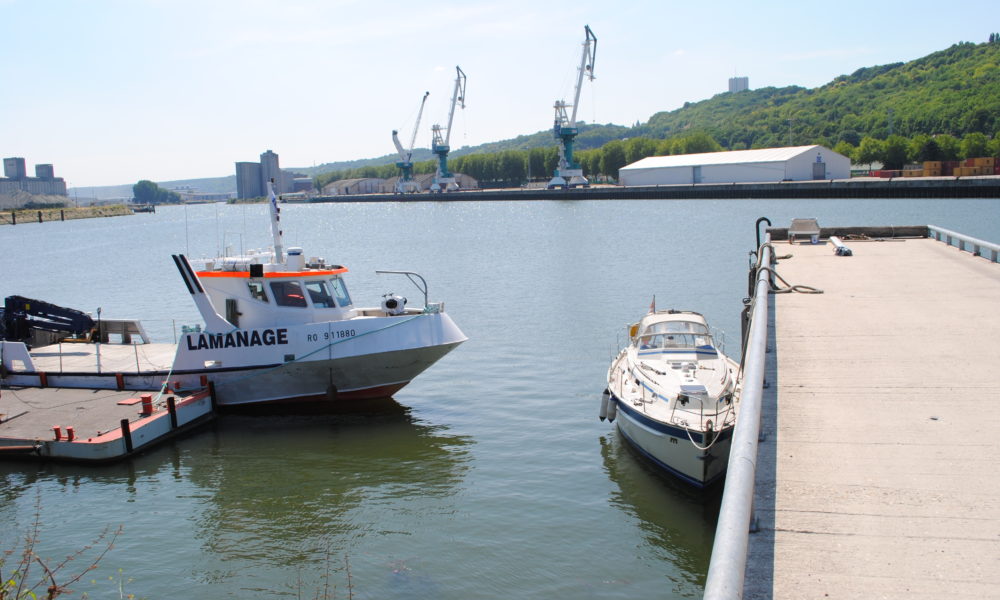
A giant fool makes our mast fall over in Rouen
49° 28′ 56.6724” N 0° 52′ 31.9008” E
July 19. – 2013
The trip continues along a morning-quiet river. We meet one French riverboat coming from Le Havre. Otherwise nothing. Beautiful nature. Dramatic with fine and occasionally pompous country houses. A single jogger. Otherwise everything is hushed.
As we approach Rouen, there is more life. By the many wharves in the giant industrial area up to Rouen the day’s work is in progress. Here are our “friends” from yesterday – river boats and cargo ships – that overtook us. Total 10 to 12 known ships are being loaded or unloaded.
We find the marina in Rouen. Completely new. But quite small. A dozen local boats and next – a great guest harbour, where we are free to choose any spot, because we are the only guests.
Harbour master Jean Marie is very French, gesticulating, and polite, shakes hands and does not know all the good things, he will do for us. He is, however, more and more confused as the day progresses. He did well, as long as we were the only guests. But when later a French boat docked in the guest harbour after six weeks of travel from the Mediterranean, and a little later also a British motor boat, that had just been to Paris, then it was too much for Jean Marie. He stressed, mixed boats together, thought at one point that now, there were two “Malø’s” in his harbour (we had at the time demasted Ronja, and stuff like that can be very confusing, so late in the day). At eight thirty in the evening he resigned. He should have been finished work at 19. But there “had not been a spare moment.”
After arrival to Rouen Per immediately sought the Rouen office of COOP Lamanage, which was located next to the marina. Our German carrier, Wolfgang Graf, has recommended that we use this company to get the mast off, and then he would come within the next weeks to pick up the mast and boom and drive it to Navy Services in Port St. Louis at the Mediterranean.
Not one of the people at Lamanage understand English. Yes, one does, Christoph, but he was on vacation.
“Eh, j’ai une bateau. Et je eh … ” That really went sluggish. But gradually they understood. I would have help to get the mast, and I wanted a quick deal. Ideally today, Friday. They checked the tide tables. It had to be low tide, when the operation was carried out, otherwise the crane wouldn’t be high enough for the task.
15.00 o’clock?
Oui! Perfectement. Merci beaucoup!
Four hours to take down the sails. Pack them together. Down with flag lines. Down with lazy jacks. Removing a few turnbuckles of the starboard and port sides. Away with the boom and kickingstrap.
At 14:30 we were ready and sailed over to Lamanage, slightly ahead of schedule.
And then it all got wrong. Per was keen to achieve as much as possible within the time, we have rented a crane operator and a handy man, so he went ahead with loosening more turnbuckles in anticipation, that right there the people from Lamanage would be ready to play their part, and as we always have done with Jesper, when we took off the mast of our old Albin Ballad, “Lazzaron”. But at that boat the mast was pierced down through the cabin top. Not so on Ronja.
Suddenly Kirsten screams: “The mast is falling.”
Slowly and majestically the mast falls to the starboard railing and stops when it hits the crane and settles at an angle of 75 degrees.
Now a throng of people show up at the quayside, all looking down at the fools who had capsized their own mast. “Fou,” they say, among several other things. It did not sound like something good.
Once again the french are showing, that they are french. They gesture. They discuss. Everyone has good advice. The crane operator interrupts with a plan. Per was prompted to re-establish an additional turnbuckle on the port side, and with a thick rope in the mast four Frenchmen from a nearby berth pulled in the rope and got the mast back to a vertical position and the crane got a firm grip on the mast.
Per continues to dismantle turnbuckles, while the French discuss further up on the bridge. “Is there not one of you who can give my husband a hand?” asks Kirsten. That they do not understand one bit of. The crane operator is a crane operator, and he will not move from his place by crane console. The extra henchman slowly realises, that if there is one, who should help these tourists with practical work, it might be him. He loosens the forestay and backstay and advises on what leads up through the mast to be screwed off, when the mast is lifted. The mast rises towards the sky. They may perhaps be lazy, but they are extremely professional with such a crane.
The mast and boom are driven into a warehouse, where we have an agreement that, tomorrow, Saturday, we will come in and dismantle the VHF antenna, shrouds, lanterns and in general make the mast ready for transport to the Mediterranean. We pay the bill, 159 Euro, for the removal of the mast and storage of the mast and boom for up to two weeks. Per gave them 30 Euro extra for having saved us out of our stupid situation, when he had loosened the last turnbuckles prematurely.
This is the kind you learn from. That kind of errors we will hardly make again. “Learning by doing”.
Back at the now castrated sailboat, we meet a French couple who had just arrived after sailing for six weeks from the Mediterranean to Rouen. They look cool. Fenders around the entire ship. Fender boards. Suntanned. “Do not take the same route as us,” they say. “We stick only one metre deep, and we still had problems with our draft”. They draw upon their experience and explain where the good ports are. They give us a special-version of the fluvia-carte with descriptions of ports along the way.
The French have chosen the same helpers as us. They have established business with a German company to transport their two masts and two booms from Port St. Louis to Rouen. It turns out to be Wolfgang Graf. Price: 1100 Euro for two masts and two booms. We have agreed a price of 55 Euro per meter for the mast and 50 Euro extra for the boom, it sounds very reasonable and is certainly much cheaper than the two French companies, that we also had a quote from.
In the evening we rent electric bikes and ride into Rouen to eat. Rubbish meal. A poor salad and a sad burger. International cuisine – a little Irish, a little French, a little Italian – indifference at a very low level.
But hey! It is great fun to cycle on electric bicycles. You get a tremendous kick in the rear when pedalling. It is half the effort and twice the pleasure. We get to see the inner harbour and part of the surrounding city.
Log-book: Sailed distance: 15 miles. Time: Afgang from Duclair 7.30. Arrival in Rouen 9.30. Weather: Calm and warm in the morning.
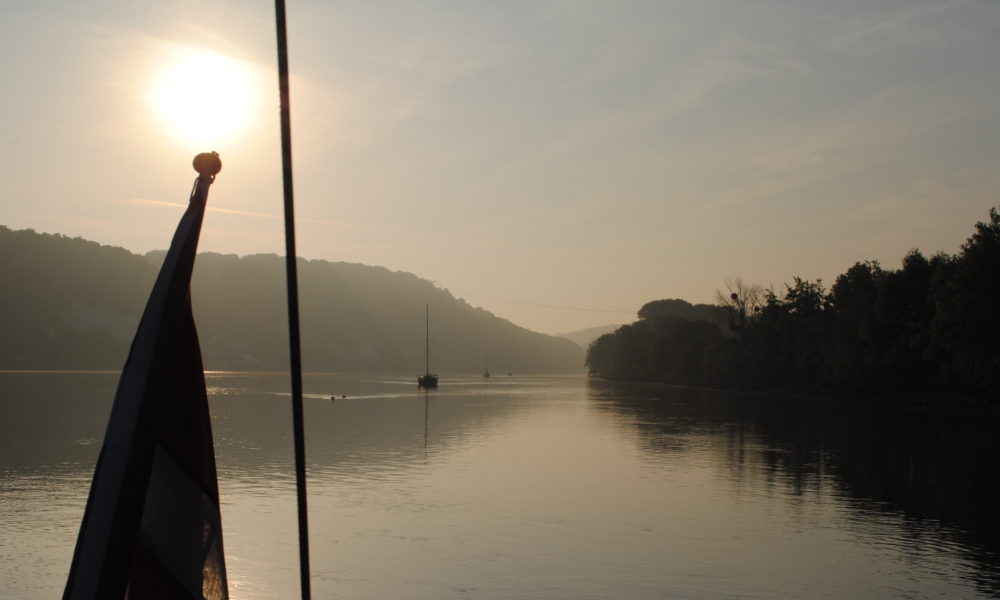
Tidal Seine is rough, desolate and magnificent nature
49° 29′ 39.732” N 0° 6′ 28.5444” E
July 18. – 2013
We had already asked for advice at the port office. “Go at low tide minus two hours,” they told us. Low tide in Le Havre on July 18 is 13.22. Minus two hours is 11.22. As a precaution, we leave at 11.15. It gave us the time for a quiet morning with a long run along the seafront in Le Havre, bath and breakfast.
The two hours before low tide, we use at getting to the entrance of the Seine. In the river there are some scary areas with shallow water, and it was explained to us, that they move from year to year, so as a precaution we have to sail far out into the English Channel before we swing into the entrance to Seine.
It turns out that there are two factors working against us. Today it is neaps. This happens once a month and means that the tidal current is less strong than normal – and therefore we get less co-current flow. At the same time, the wind is strong – 9-11 metres per second – and it slows our speed, as the wind mostly goes against us.
Therefore, we are not reaching today’s goal, Rouen, but have to moor Ronja to an anchor buoy some 15 nautical miles before Rouen as the tidal power is strong, and it becomes impossible to reach our goal within a half hour before sunset, which is the limit for boating on the Seine . We tie up to a very beautiful place.
Deciduous trees are all along the riverbank. Direct view of the sunset. Pies, bread and cheese provide an excellent evening meal at about nine.
The part of the Seine, which is called the “tidal Seine” is very special. Far more deserted than we had expected. Raw and steep nature. Not a single house has a boat in the front yard, which we have become accustomed to in Holland. In one day we come across less than a handful of boats like ours but maybe a dozen cargo ships. Beautiful scenery alternates with stinking industrial areas. When we are doing the best we log 9.5 knots. But for long periods we have – because of neaps and headwinds – difficulty to exceed six knots.
The special feature of the 120 kilometres along the Seine up to Rouen is also, that there are practically no places where you can dock or go to port. The back of the Seine estuary is the town of Honfleur. But then follows more than 50 miles without a single port or anchorage. Deserted. It is a pure coincidence that we find a private anchor buoy, which is free and we have no qualms spending our night in a small town called Duclair.
Log-book: Sailed distance: Close to 60 nautical miles. Time: Departure 11.15 from Le Havre. Arrival 20:30 in Duclair. Weather: Wind up to 11 meters per second from the NNE.
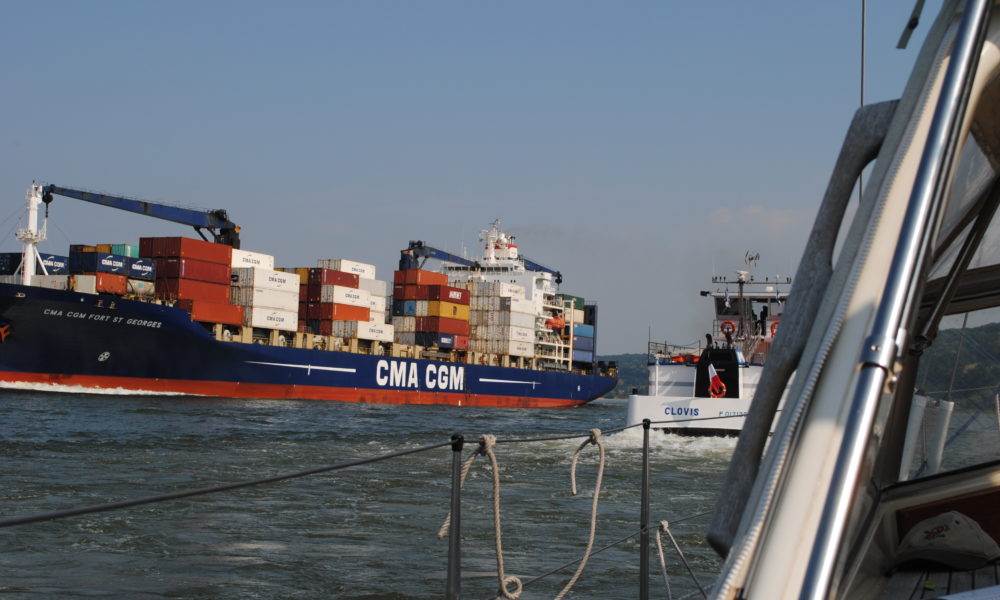
Trend: The further we go south, the higher the price for mooring
49° 55′ 22.7712” N 1° 4′ 38.9388” E
July 17. – 2013
Again, we have problems with the autopilot. We thought that we had solved the problem. But it is still there. In a new form. The autopilot controls the whole game. It is fighting apparently a desperate fight to make the rudder steer a course, that has nothing to do with reality.
Time for the manual again. I hate manuals. We carry out a deviation test by letting “Ronja” sailing around in a circle with two knots – a total round trip of three minutes – while the pilot and the GPS system detects deviation. Then we adjust the indicator again, and we adjust the exchange rate between pilot and GPS as the autopilot consistently believes, that the direction it must follow, is 12 degrees less than what the rest of the GPS system has set.
Several times along the way we think, that we should have a professional Raymarine expert look at the problems. But after some time of experimenting, it seems that we have solved the problem ourselves. And nothing is better than you yourself solving a problem on your own boat.
Today we set sail. Not long. But psychologically it is great to be sailing down through the English Channel.
Le Havre is a large port. For leisure boats it has a huge marina. We walk around the city, we find it difficult to find an absolute centre of the city, but we see many shopping streets, we find a “les halles” market with truly delicious food, and enjoy a beautiful town hall and a theatre house under construction, “Volcan”, which looks like a severed blast furnace from the Ruhr area, and we also take a look inside a church, that looks like a space ship on a launch pad.
It is becoming more and more expensive to moor in a port. In the Netherlands, we paid 11.50 Euro for a night in “Lisse”. We paid 9.30 Euro for an overnight stay in Gouda – beautiful location but not many sanitary facilities. In the City Marina Rotterdam, we paid 27 Euro for a great location and some exceptionally sanitary facilities. In Stichting Veerhaven Rotterdam, we paid 23 Euro for a single button so luxurious accommodation. The Royal Belgian Sailing Club Zeebrugge, Belgium, we paid 28.09 Euro for an overnight stay. In Calais, we paid 23.75 euros per night. In Boulogne-sur-mer, we paid 24 Euros for something that barely was in order. In Port de Dieppe, we paid 30 Euro for a lot of facilities, even though we just used their garbage. And when we arrived at Le Havre, we note that the price has risen to 34 Euro for some services, of which we only used electricity, Internet and water. It is becoming more and more expensive.
It is said that when we reach the Mediterranean, it will get really expensive.
Log-book: Sailed distance: 62 miles. Time: Departure 06.30 from Dieppe. Arrival 14:30 in Le Havre. Weather: Calm, weak sun and tides in our back for the first two thirds of the trip. Then more wind from the northwest, which we tried to take advantage of with the sails.
